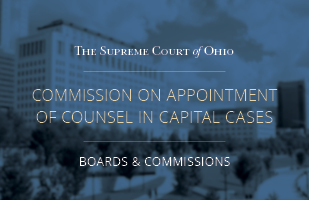Appointment of Counsel in Capital Cases: Attorneys Fighting for Life

The Commission on Appointment of Counsel in Capital Cases vets and approves the attorneys who seek to litigate death penalty cases.

The Commission on Appointment of Counsel in Capital Cases vets and approves the attorneys who seek to litigate death penalty cases.
Editor’s Note: This story is a part of a series on the Ohio Supreme Court’s boards and commissions.
While all attorneys are entrusted by clients to protect their best interests throughout trials and appeals, none have as much at stake as those advocating for their client’s right to live.
The Ohio Supreme Court’s Commission on Appointment of Counsel in Capital Cases is charged with ensuring the fitness of attorneys who take on the responsibilities of death penalty cases.
“The constitutions of the United States and the state of Ohio guarantee these defendants that their litigation will be fair,” said commission Chair John Martin. “That commitment to fairness starts with the constitutional guarantee that all defendants have the effective assistance of counsel.”
Martin is an assistant public defender in the Cuyahoga County Public Defender’s Office, whose caseload includes representing capital defendants at the trial and appellate levels.
He’s one of five commissioners responsible for the certification of capital case-qualified attorneys through careful auditing, rigorous training, and conscientious education aimed at protecting indigent clients facing capital charges.
Given the high percentage of court-appointed counsel in capital cases, it’s a legal duty that’s significant and frequent. According to the U.S. Department of Justice, most capital defendants in state and federal cases are represented by public defenders or court-appointed attorneys.
“The attorneys who represent a capital defendant are tasked with the responsibility of ensuring their client is well-represented with respect to what is, literally, a question of life and death,” he said.
To incorporate the varied perspectives of legal professionals who participate in capital cases, the commission consists of representatives from the Ohio Association of Criminal Defense Lawyers (OACDL), the Ohio Public Defender’s Office, the Ohio Metropolitan Bar Association Consortium, the Ohio Judges Association, and the Ohio State Bar Association (OSBA).
Commissioners meet at least twice annually and serve three-year cycles with a cap of three consecutive terms.
To be certified for appointment by a court to represent a defendant in a death penalty case, an attorney must meet experiential and educational prerequisites.
Those seeking capital-appointed designations can be certified as lead or co-counsel for trial representation or as appellate counsel. Certification depends on an attorney having specified amounts of trial or appellate experience.
In addition, every attorney appointed in capital cases, either as trial or appellate counsel, must complete 12 hours of continuing legal education (CLE) credit every two years that the commission certifies as germane to capital cases. In this regard, the commission interacts with the OSBA and the OACDL – the two primary sources of capital case CLE in Ohio – to develop and approve educational content.
The commission also reviews requests to certify out-of-state courses for capital CLE credits.
The purpose of the educational certification is to ensure that attorneys handling capital cases are specially equipped to serve clients in this unique area of representation, where juries not only determine if a defendant is guilty, but also recommend whether a death sentence can be imposed.
“Our goal is to ensure that Ohio's attorneys are well trained. We recognize the value in enabling attorneys to learn at a variety of seminars and, in turn, to bring new ideas and skills to their capital practice,” Martin added.
On top of preparing certified attorneys for capital cases, the commission has a parallel purpose to assist judges responsible for assigning lawyers to clients who can’t afford representation.
“The commission is committed to enabling Ohio's judges to appoint attorneys whose representation of indigent defendants will be of the same quality as if the defendant had retained counsel of their choice,” said Martin.
“The decision to impose the death penalty cannot be made without ensuring that the defendant has received a fair trial,” he said.
Service on the commission is one of the many ways an attorney or judge can give back to the profession. The Commission on Appointment of Counsel in Capital Cases, like other boards and commissions, has a need for volunteers to share in maintaining the integrity of the profession. The justices of the Ohio Supreme Court appoint the members of the commission through recommendations from its partner organizations and are always grateful for applications from those willing to serve.


